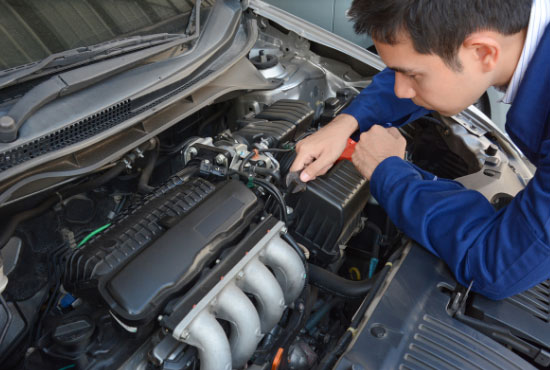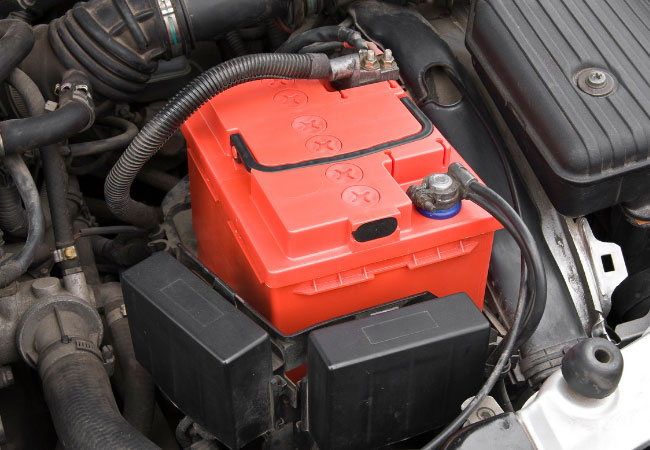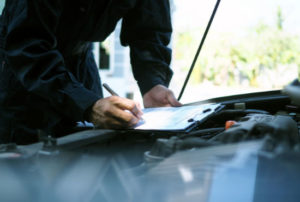When you press your foot down on the accelerator you expect the vehicle to smoothly gain speed accordingly. When the response you get is a jerking motion while the vehicle is gaining speed you tend to get a little concerned.
Why is my Jeep Wrangler Jerking while accelerating?
There are several conditions that cause this response but the best reason I have is that your fuel to air ratio is not correct.
Common Reasons A Vehicle May Jerk during Acceleration

Fuel Filter
Your problem may be that your fuel filter needs to be replaced. The fuel filter stops any debris or particulates from getting into the fuel system of your vehicle and interrupting them. Those caught pieces of debris are held in the filter so eventually, the filter gets stopped up.
If your vehicle is acting like it is not getting enough gas try cleaning or replacing your fuel filter. You may see a world of difference in its performance and abilities.
Fuel Pump
The fuel pump is more complicated than the filter but it could be the reason why your vehicle is jerking when you press on the accelerator.
The pump could also reduce the fuel the vehicle receives when you are on an incline and cause the vehicle to jerk or stall.
What to do:
If you suspect the fuel pump is the cause of your problems you are going to need to get it replaced.
Alternator problems

You cannot look at an alternator and declare it to be worn out or going out. The reason a bad alternator causes your vehicle to jerk and shake when you accelerate is that the battery that is not getting the right charges from the alternator may confuse the signal the accelerator sends.
Bad Battery

Your battery is the life power to all of the systems and features of your vehicle. Without the right electrical power, the parts of your vehicle are not going to work as they should. A bad battery can cause signals to get confused and instead of the accelerate signal going to the carburetor to open up for more fuel it might go to the braking system.
If the battery is the cause of the jerking, you have more than likely noticed symptoms before this one.
Bad Battery signs
- The car may have been hard to crank or slow to crank
- When you try to crank the vehicle, you may have heard clicking before the engine tried to start
- The headlights may not have been burning as brightly as they once did
- The vehicle may have been backfiring
Most of the time a battery goes bad because it has simply worn out over time. When you purchase a battery an age stamp is on the outside of the unit and that age stamp is marked to show the expected life of the battery.
Sometimes batteries die due to exposure to extreme temperatures or excessive usage. You cannot always rely on the age stamp to be one hundred percent correct about how many years your battery will serve you.
What to do:
If you have a bad battery you are going to have to go ahead and buy a new one. Battery prices have increased over the past several years so do not be surprised if you spend more than $150 to replace your old one.
Take the old battery in with you and you can get a few dollars off of the purchase price by using the old one as a trade-in core.
Spark Plugs That Need To Be Replaced
The spark plugs in your engine keep your vehicle running as smooth as silk. If the spark plugs start to get old or have a problem then your engine functions and responses will not be what you expect them to be.
Bad spark plugs can make the engine jerk and sputter when you accelerate. They can also make you use a lot more fuel than you are used to using.
Signs of bad spark plugs
You can look at the plugs and tell if they are good or bad. Bad spark plugs may:
- Have tips that are light grey or tan
- Have electrodes that have discolored and turned black
- Have large gap openings. The gap on a spark plug increases as you drive. The gap growth in a spark plug is normally about .001 inches for every 1000 miles of use.
What to do
You have the option of trying to clean up the plugs you have or replace them with new ones.
To clean up the plugs you need to remove them from the engine and clean them thoroughly.
Take a fingernail file or an emery board and file the electrodes to remove any corrosion.
Re-set the gap back to what it was originally when the plug was new and then put the plugs back into the engine.
Upstream O2 Sensors Are Not Functioning Properly
The O2 sensors are connected to the exhaust system of your vehicle. You might have two of these sensors or you could have four of them depending on the vehicle and the engine you have.
These sensors send signals when the injector pulse width needs to be adjusted according to the amount of oxygen content that is in the fuel you are running.
If you have more oxygen in the fuel than is normally required then the voltage output you have will be increased.
If you have less oxygen in the fuel than is required then the voltage output is decreased.
If the ratio changes from the desired ratio you are going to experience jerking upon acceleration. The vehicle may stall, and it may have a difficult time gaining any speed.
What to do
Replace the O2 sensors with new ones. Do not just replace one of these go ahead and replace the total sum of all of them.
Changing out these sensors may require you to hire a professional. The sensors are not that difficult to change but knowing the right sequence and everything pertaining to these sensors may require some mechanical education that you do not have.
If you do take the vehicle to a shop they can run diagnostic tests to determine which sensors are bad and they may be able to help you understand what caused the sensor to develop problems. The root cause may have to be addressed or your new sensors may not last as long as they are expected to.
Frequently Asked Questions
Is It Normal for Jeeps to Jerk or Lunge?
It is not normal for your Jeep to jerk or lunge when you depress the accelerator pedal. This is an indication that something is wrong with the vehicle.
How Do You Stop A Jeep From Jerking When You Accelerate?
The only way to stop a Jeep from jerking when you accelerate is to evaluate all of the components that could be causing this to happen and repair or replace the problem caused.
Are Jeeps The Only Vehicles That Jerk When You Accelerate?
If a Jeep has a problem with the fuel, exhaust, or electrical system it might jerk when you accelerate. The same thing is true of any vehicle made by any manufacturer.
Other Jeep Related Articles
1. Are Jeep Wranglers Manual or Automatic Transmission?
2. Jeep Wrangler Steering Wheel Jerks When Turning
3. Jeep Wrangler Knocking Noise When Accelerating
4. Clicking Noise When Turning in 4 Wheel Drive
Final Thoughts
If your Jeep is jerking when you accelerate or if it is not responding properly when you accelerate then you need to find the cause and rectify the problem. Your Jeep should quickly gain power and speed when the accelerator is depressed, not jerk and make noises. If you cannot quickly identify the problem see a Jeep certified mechanic and let them put the vehicle on their diagnostic machine to pinpoint the problem for you.
Never continue to drive a vehicle that is showing small signs of a problem. Those small signs are gentle warnings and if you wait they can develop into big problems.

